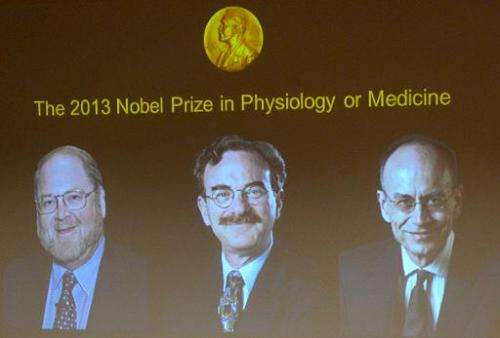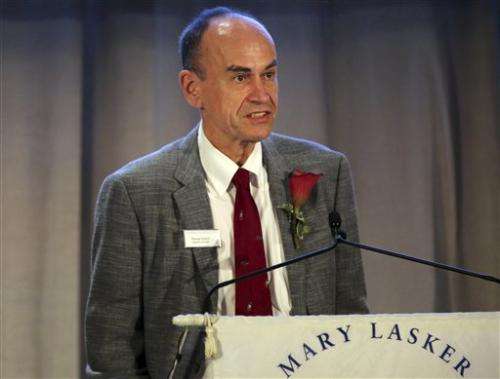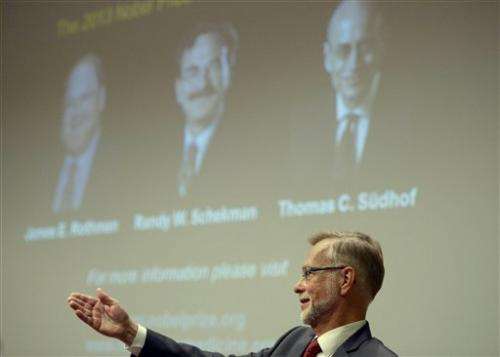Two Americans, German win Nobel medicine prize (Update 3)

Two Americans and a German-American won the Nobel Prize in medicine on Monday for discovering how key substances are transported within cells, a process involved in such important activities as brain cell communication and the release of insulin.
James Rothman, 62, of Yale University, Randy Schekman, 64, of the University of California, Berkeley, and Dr. Thomas Sudhof, 57, of Stanford University shared the $1.2 million prize for their research on how tiny bubbles called vesicles act as cargo carriers inside cells.
This traffic control system ensures that the cargo is delivered to the right place at the right time and keeps activities inside cells from descending into chaos, the committee said. Defects can be harmful, leading to neurological diseases, diabetes and disorders affecting the immune system.
"Imagine hundreds of thousands of people who are traveling around hundreds of miles of streets; how are they going to find the right way? Where will the bus stop and open its doors so that people can get out?" Nobel committee secretary Goran Hansson said. "There are similar problems in the cell."
The winners' discoveries in the 1970s, '80s and '90s have helped doctors diagnose a severe form of epilepsy and immune deficiency diseases in children, Hansson said. In the future, scientists hope the research could lead to medicines against more common types of epilepsy, diabetes and other metabolism deficiencies, he added.
Schekman said he was awakened at 1 a.m. at his home in California by the chairman of the prize committee, just as he was suffering from jetlag after returning from a trip to Germany the night before.
"I wasn't thinking too straight. I didn't have anything elegant to say," he told The Associated Press. "All I could say was 'Oh my God,' and that was that."
He called the prize a wonderful acknowledgment of the work he and his students had done and said he knew it would change his life.
"I called my lab manager and I told him to go buy a couple bottles of Champagne and expect to have a celebration with my lab," he said.
In the 1970s, Schekman discovered a set of genes that were required for vesicle transport, while Rothman revealed in the 1980s and 1990s how vesicles delivered their cargo to the right places. Also in the '90s, Sudhof identified the machinery that controls when vesicles release chemical messengers from one brain cell that let it communicate with another.
"This is not an overnight thing. Most of it has been accomplished and developed over many years, if not decades," Rothman told the AP.
Rothman said he lost grant money for the work recognized by the Nobel committee, but he will now reapply, hoping the Nobel prize will make a difference in receiving funding.

Sudhof, who was born in Germany but moved to the U.S. in 1983 and also has U.S. citizenship, told the AP he received the call from the committee while driving toward the city of Baeza, in southern Spain, where he was due to give a talk.
"I got the call while I was driving and like a good citizen I pulled over and picked up the phone," he said. "To be honest, I thought at first it was a joke. I have a lot of friends who might play these kinds of tricks."
The medicine prize kicked off this year's Nobel announcements. The awards in physics, chemistry, literature, peace and economics will be announced by other prize juries this week and next. Each prize is worth 8 million Swedish kronor ($1.2 million).
Rothman and Schekman won the Albert Lasker Basic Medical Research Award for their research in 2002—an award often seen as a precursor of a Nobel Prize. Sudhof won the Lasker award this year.
"I might have been just as happy to have been a practicing primary-care doctor," Sudhof said after winning that prize. "But as a medical student I had interacted with patients suffering from neurodegeneration or acute clinical schizophrenia. It left an indelible mark on my memory."
Jeremy Berg, former director of the National Institute of General Medical Sciences in Bethesda, Maryland, said Monday's announcement was "long overdue" and widely expected because the research was "so fundamental, and has driven so much other research."
Berg, who now directs the Institute for Personalized Medicine at the University of Pittsburgh, said the work provided the intellectual framework that scientists use to study how brain cells communicate and how other cells release hormones. In both cases, vesicles play a key role by delivering their cargo to the cell surface and releasing it to the outside, he told the AP.
So the work has indirectly affected research into virtually all neurological disease as well as other diseases, he said.
Established by Swedish industrialist Alfred Nobel, the Nobel Prizes have been handed out by award committees in Stockholm and Oslo since 1901. The winners always receive their awards on Dec. 10, the anniversary of Nobel's death in 1896.
Last year's Nobel medicine award went to Britain's John Gurdon and Japan's Shinya Yamanaka for their contributions to stem cell science.

A look at the winners of Nobel Prize in medicine
WHO WON?
Americans James E. Rothman, 62, professor of biomedical sciences at Yale University; Randy W. Schekman, 64, professor of cell and developmental biology at the University of California, Berkeley; and German-born Thomas C. Sudhof, 57, professor in the School of Medicine at Stanford University.
FOR WHAT?
For their discoveries of how hormones, enzymes and other key materials are transported within cells, a process known as "vesicle traffic."
SIGNIFICANCE
The discovery solves the mystery of how animal cells organize their internal transportation system to direct molecules to the correct place.
This helps explain how certain illnesses, including diabetes, tetanus and many immune diseases, work.
WHAT THEY SAID:
James E. Rothman: "This is not an overnight thing. Most of it has been accomplished and developed over many years, if not decades."
Randy W. Schekman: "As far as my lab goes, I was excited about what we were doing yesterday and will be excited about the work we are doing tomorrow."
Thomas C. Sudhof: "At least in the United States, which is now my home, there is a lot of soul-searching about the sense of science. And I hope and believe that I can do a little bit to help clarify the positions."
Recent winners of Nobel Medicine Prize
Here is a list of the winners of the Nobel Medicine Prize over the past 10 years, following the latest award on Monday:
2013: James E. Rothman (US), Randy W. Schekman (US) and Thomas C. Suedhof (Germany)
2012: Shinya Yamanaka (Japan) and John B. Gurdon (Britain)
2011: Bruce Beutler (US), Jules Hoffmann (France) and Ralph Steinman (Canada)
2010: Robert G. Edwards (Britain)
2009: Carol Greider and Jack Szostak (US), Elizabeth Blackburn (Australia-US)
2008: Francoise Barre-Sinoussi and Luc Montagnier (France), Harald zur Hausen (Germany)
2007: Mario Capecchi (US), Oliver Smithies (US), and Martin Evans (Britain)
2006: Andrew Z. Fire (US), Craig C. Mello (US)
2005: Barry J. Marshall (Australia), J. Robin Warren (Australia)
2004: Richard Axel (US), Linda B. Buck (US)
More information: www.nobelprize.org/nobel_prize … ates/2013/press.html
© 2013 The Associated Press. All rights reserved.

















